#General Ludd
Explore tagged Tumblr posts
Text

once again i am posting hand-woven images!
#em draws stuff#...what does one even tag this with. well it is ned ludd shouting at a gundam. make of it what you will.#idea drawn from a joke in the fashion bonus episode of well there's your problem and also the increasing general Situation wrt Art in 2024#the situation's a mess and perhaps I'd smash a few knitting frames myself under the circumstances!!!#oh and the lyrics on the poster are from the robert calvert song of the same name
140 notes
·
View notes
Text
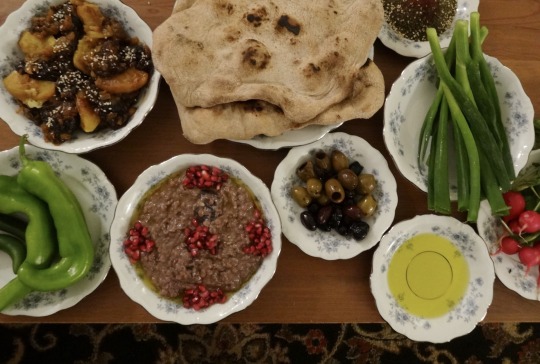
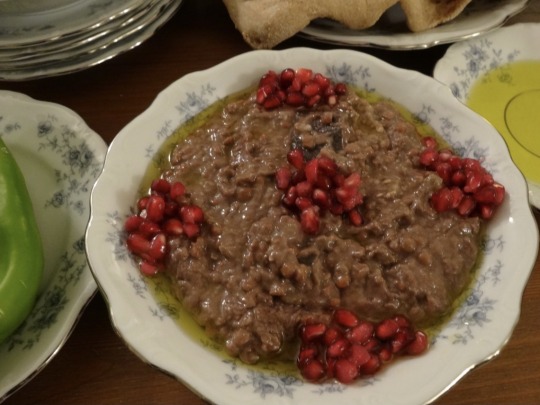
[ID: A purplish-grey stew topped with olive oil and garnished with piles of pomegranate seeds. Plates of green peppers, bitter olives, olive oil, taboon bread, green onions, radishes, and za'tar surround the dish. The second image is a close-up of the same stew. End ID]
رمانية / Rummāniyya (Palestinian pomegranate stew)
Rummaniyya (رُمَّانِيَّة; also transliterated "rumaniyya," "rummaniya," and "rummaniyeh") is a Palestinian stew or dip made from lentils, eggplant, and pomegranate seeds, flavored with nutty red tahina and a zesty, spicy دُقَّة (dugga) of dill seeds, garlic, and peppers. A طشة (ṭsha), or tempering, of olive oil and onion or garlic is sometimes added.
"Rummaniyya," roughly "pomegranate-y," comes from رُمَّان ("rummān") "pomegranate," plus the abstract noun suffix ـِيَّة ("iyya"); the dish is also known as حبّة رُمَّانَة ("ḥabbat rommāna"), or "pomegranate seeds." It is a seasonal dish that is made at the end of summer and the beginning of fall, when pomegranates are still green, unripe, and sour.
This stew is considered to be one of the most iconic, historic, and beloved of Palestinian dishes by people from Gaza, Yaffa, and Al-Ludd. Pomegranates—their seeds, their juice, and a thick syrup made from reducing the juice down—are integral to Palestinian cuisine and heritage, and images of them abound on ceramics and textiles. Pomegranates and their juice are sold from street carts and cafes in the West Bank and Gaza.
Today, tens of thousands of tons of pomegranates are grown and harvested by Israeli farmers on stolen Palestinian farmland; about half of the crop is exported, mainly to Europe. Meanwhile, Palestinians have a far easier time gaining permits to work on Israeli-owned farms than getting permission from the military to work land that is ostensibly theirs. These restrictions apply within several kilometers of Israel's claimed borders with Gaza and the West Bank, some of the most fertile land in the area; Palestinian farmers working in this zone risk being injured or killed by military fire.
Israel further restricts Palestinians' ability to work their farms and export crops by imposing tariffs, unexpectedly closing borders, shutting down and contaminating water supplies, spraying Palestinian crops with pesticides, bulldozing crops (including eggplant) when they are ready to be harvested, and bombing Palestinian farmland and generators. Though Palestinian goods have local markets, the sale of Palestinian crops to Israel was forbidden from 2007 to 2014 (when Israel accepted shipments of goods including tomato and eggplant).
Gazans have resisted these methods by disregarding orders to avoid the arable land near Israel's claimed borders, continuing to forage native plants, growing new spices and herbs for export, planting hydroponic rooftop gardens, crushing chalk and dried eggplants to produce calcium for plants, using fish excrement as fertilizer, creating water purification systems, and growing plants in saltwater. Resisting Israeli targeting of Palestinian food self-sufficiency has been necessary for practical and economic reasons, but also symbolizes the endurance of Palestinian culture, history, and identity.
Support Palestinian resistance by calling Elbit System's (Israel's primary weapons manufacturer) landlord; donating to Palestine Action's bail fund; and buying an e-Sim for distribution in Gaza.
Serves 6-8.
Ingredients:
For the stew:
1 medium eggplant (370g)
1 cup brown lentils (عدس اسود)
600g pomegranate seeds (to make 3 cups juice)
3 Tbsp all-purpose flour
1/4 cup red tahina
1/2 cup olive oil
Salt, to taste
Citric acid (ملح الليمون / حامِض ليمون) (optional)
Red tahina may be approximated with home cooking tools with the above-linked recipe; you may also toast white tahina in a skillet with a little olive oil, stirring often, until it becomes deeply golden brown.
For the دُقَّة (dugga / crushed condiment):
2 tsp cumin seeds, or ground cumin
1 1/2 Tbsp dill seeds ("locust eye" بذور الشبت / عين جرادة)
5 cloves garlic
1 green sweet pepper (فلفل بارد اخضر)
2 dried red chilis (فلفل شطة احمر)
People use red and green sweet and chili peppers in whatever combination they have on hand for this recipe; e.g. red and green chilis, just green chilis, just red chilis, or just green sweet peppers. Green sweet peppers and red chilis are the most common combination.
For the طشة (Tsha / tempering) (optional):
Olive oil
1 Tbsp minced garlic
Instructions:
1. Rinse and pick over lentils. In a large pot, simmer lentils, covered, in enough water to cover for about 8 minutes, or until half-tender.
2. Meanwhile, make the dugga by combining all ingredients in a mortar and pestle or food processor, and grinding until a coarse mixture forms.
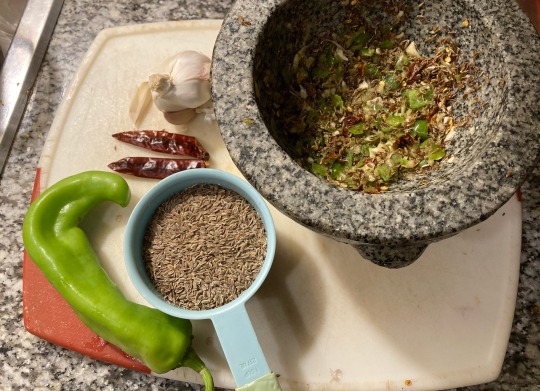
Dugga and components.
3. Cube eggplant. A medium-sized eggplant may be cut in half lengthwise (through the root), each half cut into thirds lengthwise, then cubed widthwise.


Cubed eggplant, red tahina, and pomegranate seeds.
4. Add eggplant to simmering water (there is no need to stir).

5. While the eggplant cooks, blend pomegranate seeds in a blender very thoroughly. Strain to remove any gritty residue. Whisk flour into pomegranate juice.

Pomegranate juice being strained.
6. Taste your pomegranate juice. If it is not sour, add a pinch of citric acid or a splash of lemon juice and stir.
7. Add dagga to the pot with the lentils and eggplant and stir. Continue to simmer until the eggplant is very tender and falling apart.
8. Add pomegranate juice, tahina, and olive oil to the pot, and simmer for another 5 minutes, or until stew is very thick and homogenous.

Bright pink pomegranate juice in stockpot.
9. (Optional) In a small skillet, heat a little olive oil on medium. Fry minced garlic, stirring constantly, until golden brown. Add into the pot and stir.
10. (Optional) Mash the stew with the bowl of a ladle or a bean masher to produce a more homogenous texture.
Serve rummaniyya hot or cold in individual serving bowls. It may be served as an appetizer, or as a main dish alongside flatbread, olives, and fresh vegetables such as radishes, green peppers, green onions, carrots, and romaine lettuce. It may be eaten with a spoon, or by using كماج (kmāj), a flatbread with an internal pocket, to scoop up each bite.
571 notes
·
View notes
Text
Brian Merchant’s “Blood In the Machine”
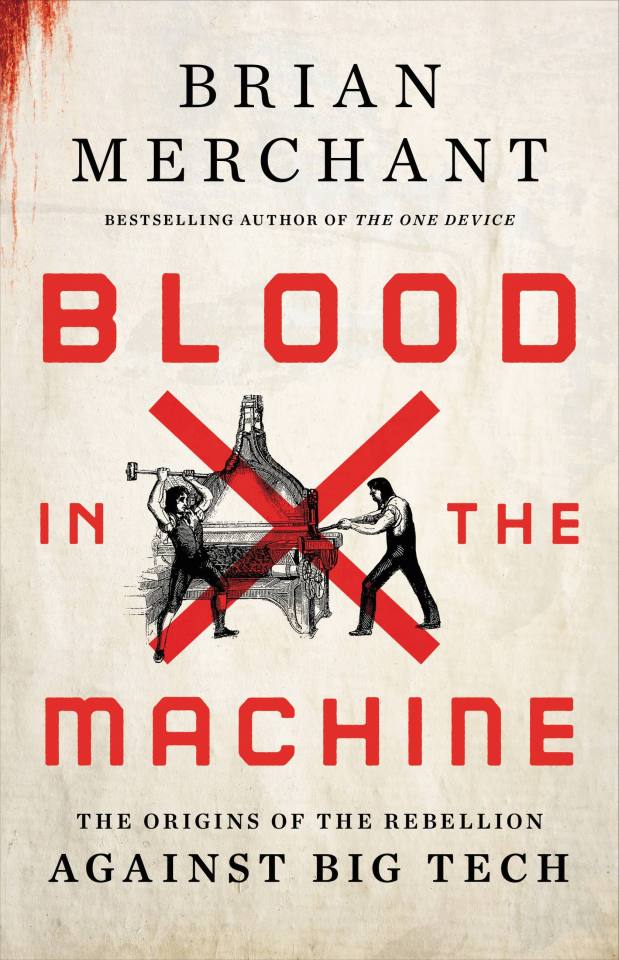
Tomorrow (September 27), I'll be at Chevalier's Books in Los Angeles with Brian Merchant for a joint launch for my new book The Internet Con and his new book, Blood in the Machine. On October 2, I'll be in Boise to host an event with VE Schwab.

In Blood In the Machine, Brian Merchant delivers the definitive history of the Luddites, and the clearest analysis of the automator's playbook, where "entrepreneurs'" lawless extraction from workers is called "innovation" and "inevitable":
https://www.littlebrown.com/titles/brian-merchant/blood-in-the-machine/9780316487740/
History is written by the winners, and so you probably think of the Luddites as brainless, terrified, thick-fingered vandals who smashed machines and burned factories because they didn't understand them. Today, "Luddite" is a slur that means "technophobe" – but that's neither fair, nor accurate.
Luddism has been steadily creeping into pro-labor technological criticism, as workers and technology critics reclaim the term and its history, which is a rich and powerful tale of greed versus solidarity, slavery versus freedom.
The true tale of the Luddites starts with workers demanding that the laws be upheld. When factory owners began to buy automation systems for textile production, they did so in violation of laws that required collaboration with existing craft guilds – laws designed to ensure that automation was phased in gradually, with accommodations for displaced workers. These laws also protected the public, with the guilds evaluating the quality of cloth produced on the machine, acting as a proxy for buyers who might otherwise be tricked into buying inferior goods.
Factory owners flouted these laws. Though the machines made cloth that was less durable and of inferior weave, they sold it to consumers as though it were as good as the guild-made textiles. Factory owners made quiet deals with orphanages to send them very young children who were enslaved to work in their factories, where they were routinely maimed and killed by the new machines. Children who balked at the long hours or attempted escape were viciously beaten (the memoir of one former child slave became a bestseller and inspired Oliver Twist).
The craft guilds begged Parliament to act. They sent delegations, wrote petitions, even got Members of Parliament to draft legislation ordering enforcement of existing laws. Instead, Parliament passed laws criminalizing labor organizing.
The stakes were high. Economic malaise and war had driven up the price of life's essentials. Workers displaced by illegal machines faced starvation – as did their children. Communities were shattered. Workers who had apprenticed for years found themselves graduating into a market that had no jobs for them.
This is the context in which the Luddite uprisings began. Secret cells of workers, working with discipline and tight organization, warned factory owners to uphold the law. They sent letters and posted handbills in which they styled themselves as the army of "King Ludd" or "General Ludd" – Ned Ludd being a mythical figure who had fought back against an abusive boss.
When factory owners ignored these warnings, the Luddites smashed their machines, breaking into factories or intercepting machines en route from the blacksmith shops where they'd been created. They won key victories, with many factory owners backing off from automation plans, but the owners were deep-pocketed and determined.
The ruling Tories had no sympathy for the workers and no interest in upholding the law or punishing the factory owners for violating it. Instead, they dispatched troops to the factory towns, escalating the use of force until England's industrial centers were occupied by literal armies of soldiers. Soldiers who balked at turning their guns on Luddites were publicly flogged to death.
I got very interested in the Luddites in late 2021, when it became clear that everything I thought I knew about the Luddites was wrong. The Luddites weren't anti-technology – rather, they were doing the same thing a science fiction writer does: asking not just what a new technology does, but also who it does it for and who it does it to:
https://locusmag.com/2022/01/cory-doctorow-science-fiction-is-a-luddite-literature/
Unsurprisingly, ever since I started publishing on this subject, I've run into people who have no sympathy for the Luddite cause and who slide into my replies to replicate the 19th Century automation debate. One such person accused the Luddites of using "state violence" to suppress progress.
You couldn't ask for a more perfect example of how the history of the Luddites has been forgotten and replaced with a deliberately misleading account. The "state violence" of the Luddite uprising was entirely on one side. Parliament, under the lackadaisical leadership of "Mad King George," imposed the death penalty on the Luddites. It wasn't just machine-breaking that became a capital crime – "oath taking" (swearing loyalty to the Luddites) also carried the death penalties.
As the Luddites fought on against increasingly well-armed factory owners (one owner bought a cannon to use on workers who threatened his machines), they were subjected to spectacular acts of true state violence. Occupying soldiers rounded up Luddites and suspected Luddites and staged public mass executions, hanging them by the dozen, creating scores widows and fatherless children.
The sf writer Steven Brust says that the test to tell whether someone is on the right or the left is simple: ask whether property rights are more important than human rights. If the person says "property rights are human rights," they are on the right.
The state response to the Luddites crisply illustrates this distinction. The Luddites wanted an orderly and lawful transition to automation, one that brought workers along and created shared prosperity and quality goods. The craft guilds took pride in their products, and saw themselves as guardians of their industry. They were accustomed to enjoying a high degree of bargaining power and autonomy, working from small craft workshops in their homes, which allowed them to set their own work pace, eat with their families, and enjoy modest amounts of leisure.
The factory owners' cause wasn't just increased production – it was increased power. They wanted a workforce that would dance to their tune, work longer hours for less pay. They wanted unilateral control over which products they made and what corners they cut in making those products. They wanted to enrich themselves, even if that meant that thousands starved and their factory floors ran red with the blood of dismembered children.
The Luddites destroyed machines. The factory owners killed Luddites, shooting them at the factory gates, or rounding them up for mass executions. Parliament deputized owners to act as extensions of law enforcement, allowing them to drag suspected Luddites to their own private cells for questioning.
The Luddites viewed property rights as just one instrument for achieving human rights – freedom from hunger and cold – and when property rights conflicted with human rights, they didn't hesitate to smash the machines. For them, human rights trumped property rights.
Their bosses – and their bosses' modern defenders – saw the demands to uphold the laws on automation as demands to bring "state violence" to bear on the wholly private matter of how a rich man should organize his business. On the other hand, literal killing – both on the factory floor and at the gallows – was not "state violence" but rather, a defense of the most important of all the human rights: the rights of property owners.
19th century textile factories were the original Big Tech, and the rhetoric of the factory owners echoes down the ages. When tech barons like Peter Thiel say that "freedom is incompatible with democracy," he means that letting people who work for a living vote will eventually lead to limitations on people who own things for a living, like him.
Then, as now, resistance to Big Tech enjoyed widespread support. The Luddites couldn't have organized in their thousands if their neighbors didn't have their backs. Shelley and Byron wrote widely reproduced paeans to worker uprisings (Byron also defended the Luddites in the House of Lords). The Brontes wrote Luddite novels. Mary Shelley's Frankenstein was a Luddite novel, in which the monster was a sensitive, intelligent creature who merely demanded a say in the technology that created him.
The erasure of the true history of the Luddites was a deliberate act. Despite the popular and elite support the Luddites enjoyed, the owners and their allies in Parliament were able to crush the uprising, using mass murder and imprisonment to force workers to accept immiseration.
The entire supply chain of the textile revolution was soaked in blood. Merchant devotes multiple chapters to the lives of African slaves in America who produced the cotton that the machines in England wove into cloth. Then – as now – automation served to obscure the violence latent in production of finished goods.
But, as Merchant writes, the Luddites didn't lose outright. Historians who study the uprisings record that the places where the Luddites fought most fiercely were the places where automation came most slowly and workers enjoyed the longest shared prosperity.
The motto of Magpie Killjoy's seminal Steampunk Magazine was: "Love the machine, hate the factory." The workers of the Luddite uprising were skilled technologists themselves.
They performed highly technical tasks to produce extremely high-quality goods. They served in craft workshops and controlled their own time.
The factory increased production, but at the cost of autonomy. Factories and their progeny, like assembly lines, made it possible to make more goods (even goods that eventually rose the quality of the craft goods they replaced), but at the cost of human autonomy. Taylorism and other efficiency cults ended up scripting the motions of workers down to the fingertips, and workers were and are subject to increasing surveillance and discipline from their bosses if they deviate. Take too many pee breaks at the Amazon warehouse and you will be marked down for "time off-task."
Steampunk is a dream of craft production at factory scale: in steampunk fantasies, the worker is a solitary genius who can produce high-tech finished goods in their own laboratory. Steampunk has no "dark, satanic mills," no blood in the factory. It's no coincidence that steampunk gained popularity at the same time as the maker movement, in which individual workers use form digital communities. Makers networked together to provide advice and support in craft projects that turn out the kind of technologically sophisticated goods that we associate with vast, heavily-capitalized assembly lines.
But workers are losing autonomy, not gaining it. The steampunk dream is of a world where we get the benefits of factory production with the life of a craft producer. The gig economy has delivered its opposite: craft workers – Uber drivers, casualized doctors and dog-walkers – who are as surveilled and controlled as factory workers.
Gig workers are dispatched by apps, their faces closely studied by cameras for unauthorized eye-movements, their pay changed from moment to moment by an algorithm that docks them for any infraction. They are "reverse centaurs": workers fused to machines where the machine provides the intelligence and the human does its bidding:
https://pluralistic.net/2021/02/17/reverse-centaur/#reverse-centaur
Craft workers in home workshops are told that they're their own bosses, but in reality they are constantly monitored by bossware that watches out of their computers' cameras and listens through its mic. They have to pay for the privilege of working for their bosses, and pay to quit. If their children make so much as a peep, they can lose their jobs. They don't work from home – they live at work:
https://pluralistic.net/2021/01/22/paperback-writer/#toothless
Merchant is a master storyteller and a dedicated researcher. The story he weaves in Blood In the Machine is as gripping as any Propublica deep-dive into the miserable working conditions of today's gig economy. Drawing on primary sources and scholarship, Blood is a kind of Nomadland for Luddites.
Today, Merchant is the technology critic for the LA Times. The final chapters of Blood brings the Luddites into the present day, finding parallels in the labor organizing of the Amazon warehouse workers led by Chris Smalls. The liberal reformers who offered patronizing support to the Luddites – but didn't imagine that they could be masters of their own destiny – are echoed in the rhetoric of Andrew Yang.
And of course, the factory owners' rhetoric is easily transposed to the modern tech baron. Then, as now, we're told that all automation is "progress," that regulatory evasion (Uber's unlicensed taxis, Airbnb's unlicensed hotel rooms, Ring's unregulated surveillance, Tesla's unregulated autopilot) is "innovation." Most of all, we're told that every one of these innovations must exist, that there is no way to stop it, because technology is an autonomous force that is independent of human agency. "There is no alternative" – the rallying cry of Margaret Thatcher – has become our inevitablist catechism.
Squeezing the workers' wages conditions and weakening workers' bargaining power isn't "innovation." It's an old, old story, as old as the factory owners who replaced skilled workers with terrified orphans, sending out for more when a child fell into a machine. Then, as now, this was called "job creation."
Then, as now, there was no way to progress as a worker: no matter how skilled and diligent an Uber driver is, they can't buy their medallion and truly become their own boss, getting a say in their working conditions. They certainly can't hope to rise from a blue-collar job on the streets to a white-collar job in the Uber offices.
Then, as now, a worker was hired by the day, not by the year, and might find themselves with no work the next day, depending on the whim of a factory owner or an algorithm.
As Merchant writes: robots aren't coming for your job; bosses are. The dream of a "dark factory," a "fully automated" Tesla production line, is the dream of a boss who doesn't have to answer to workers, who can press a button and manifest their will, without negotiating with mere workers. The point isn't just to reduce the wage-bill for a finished good – it's to reduce the "friction" of having to care about others and take their needs into account.
Luddites are not – and have never been – anti-technology. Rather, they are pro-human, and see production as a means to an end: broadly shared prosperity. The automation project says it's about replacing humans with machines, but over and over again – in machine learning, in "contactless" delivery, in on-demand workforces – the goal is to turn humans into machines.
There is blood in the machine, Merchant tells us, whether its humans being torn apart by a machine, or humans being transformed into machines.
Brian and I are having a joint book-launch tomorrow night (Sept 27) at Chevalier's Books in Los Angeles for my new book The Internet Con and his new book, Blood in the Machine:
https://www.eventbrite.com/e/the-internet-con-by-cory-doctorow-blood-in-the-machine-by-brian-merchant-tickets-696349940417



If you'd like an essay-formatted version of this post to read or share, here's a link to it on pluralistic.net, my surveillance-free, ad-free, tracker-free blog:
https://pluralistic.net/2023/09/26/enochs-hammer/#thats-fronkonsteen
#pluralistic#books#reviews#brian merchant#luddism#automation#history#gift guide#steampunk#makers#tina#inevitablism#reverse centaurs#amazon#arise
548 notes
·
View notes
Text

The Industrial Revolution in song.
Cover image is from an 1835 print in the History of the Cotton Manufacture in Great Britain, held by the British Library.
The Weaver & the Factory Maid- Steeleye Span
The Hand-Loom Versus the Power-Loom- Harry Boardman
The Drift From the Land- The Young'uns
Four Loom Weaver- Maddy Prior & June Tabor
The Dalesman's Litany- Tim Hart & Maddy Prior
Poverty Knock- Chumbawamba
The Hand-Loom Weaver's Lament- Harry Boardman
Song on the Times- Windborne
General Ludd's Triumph- Roy Harris
Foster's Mill- The Short Sisters
Cropper Lads- Maddy Prior & the Girls
Pilgrim on the Pennine Way- Jon Boden
Factory Girl- Rhiannon Giddens
13 tracks; 46 mins. [Spotify]
[my other playlists]
#original playlists#hi em; still holding that thought?#this playlist partially inspired by/begun whilst watching the episode in question#(queued yonks ago to coincide with labour day)
168 notes
·
View notes
Text
Today, the label luddite is an epithet for someone afraid of technology and the change it can bring. Merchant’s book makes clear that Luddites did not fear automation in the sense of being afraid of the machines or longing for an idyllic past. On the contrary, as Merchant points out, clothworkers were often themselves intimately engaged in improving the technology they used. Some of them proposed paying for job retraining by taxing factory owners who implemented the automating machines, earning the workers the title of “some of the earliest policy futurists,” according to Merchant. These efforts—to use official channels at the local and parliamentary levels—failed, however. With their futures rapidly foreclosing, the clothworkers invoked the fictional Ned Ludd (alternatively, Ludlam), an apprentice stocking-frame knitter in the late 1700s who, the story went, responded to his master whipping him by destroying the machine. Inspired by his act of sabotage against a cruel employer, the Luddites campaigned to halt the spread of the “obnoxious machines.” Soon factory owners found threatening letters signed by Captain Ludd or General Ludd or King Ludd. The letters also allude to another hero of working people from Nottingham, Robin Hood. Merchant argues that the mutability of Ned Ludd served as an organizing symbol akin to a playful but potent meme.
[...]
The Luddites used the tools at their disposal and did so through collective action. Merchant details the day-to-day organizing efforts of the movement’s leaders. We are ushered into a clandestine world of codes and oaths, of backroom meetings and nighttime training. The scheming makes for entertaining reading. But beneath the private planning and public sabotage lurks a more lasting lesson: movements to dismantle automation’s physical infrastructure often depend on building relational infrastructure. Tight-knit communities are extraordinarily important here: they buffered the Luddites from harm and fostered creative thinking rather than merely alienation among adherents and their allies. Increasingly finding themselves wrung out by those in power, these communities coalesced around shared causes that overlooked intragroup differences. This opened space for women, Merchant tells us, to claim the nom de guerre Lady Ludd and charge into markets to demand fair food prices from shop owners and food suppliers. It worked. The “auto-reductions,” as they were called, demonstrate the power of people working together to force change. Similarly, resistance to automation can be creative and provide openings to bring myriad others into the tent.
74 notes
·
View notes
Text














"It’ll undoubtedly take some time. But I’m sure she’ll be fine. He’ll always be there with her, standing in the shadows to keep her safe, laughing with her in the light, watching through her eyes all those who get close. He’ll always be there. She will be fine." THE BLACKLIST 1.08 "General Ludd (No. 109)"
#I forgot how devastating this episode with sam was :'''#tbl*#james spader#raymond reddington#the blacklist#*#that lil monologue he gave tom was tough but looking at the big picture it's also 😵💫#raymond you have no idea how difficult she is going to make both of your lives.
33 notes
·
View notes
Text

Stranger of the Falls - Part 3
Pairing: Boromir x Reader
Rating: T
Chapter Word Count: 1700
Warnings: Graphic injury, blood
Parts: [ < Previous Part ] [ Next Part > ] [ Masterlist ]
Full story: [ AO3 ]
※※※
3. Healing
The man had not eaten anything substantial for two days so the strong potion kicked in almost immediately. You made use of his temporary lack of awareness to feed him a large bowl of nourishing broth and a jug of water, and he wolfed everything down hungrily.
You waited until Maja had fetched Ludde before you began. A bouncing, playful puppy distracting you was the last thing you needed.
Then you uncovered the swollen area. Bracing yourself for the pain you must inflict – the drugs could never take away it entirely, just make it more bearable – you willed your hand to be steady and forced the hole open so you could sink the knife into it.
The sharp blade cut easily through muscle and flesh.
“Hurtsh!” he slurred, tears breaking out in his eyes and sweat on his forehead.
“I am sorry; I know it hurts. I dare not give you more poppy extract but you may have mead if you like?”
He nodded.
A large jug of mead later you continued.
His fingers feebly scratched the mattress and you knew he forced himself to be still. A low, strained groan slipped from his clenched teeth.
Cold sweat had broken out on you as well now and your shoulders became stiff from the effort. Each grunt, each gasp from your patient felt like a slap in your face.
Yet you continued.
You had cut out most of the festering tissue but there was so much blood. You could not see the shard. But it must be there, this inflammation was much beyond a normal arrow wound.
You used a wad of your new bog moss to soak up blood. There… at last! Something black, deep down. With a pair of thin pliers you tried to pinch the edge, groping through the frayed tissue.
The man howled and his whole body tensed. “Uuuckk!” He was panting heavily, sweat trickling down his forehead.
You tried again. And again. His groans and writhing limbs made you want to cry, but you did not. You continued, and finally you caught the splinter.
“I have it,” you mumbled. “This was the worst. The worst is over now…”
Slowly you pulled it out, afraid to break it in more pieces.
“Nnnggg…” He clenched his hands into fists.
You wanted to cry again, this time with relief. Wiping your damp forehead, you coated the wound with a generous amount of ointment and covered it with clean bog moss and linen.
Främling was breathing calmer. He looked exhausted and dizzy from poppy seed and pain. Before he dozed off completely you fed him a bowl of rich broth with potatoes mashed into it.
Not long afterwards he was fast asleep.
He slept soundly all night. You did too, completely drained, both mentally and physically.
In the morning the fever was gone, but Främling did not seem happy about that at all. On the contrary, he looked murderous, and when you brought a bowl of morning broth he actually managed to sweep it out of your hands. The earthen bowl cracked in halves, spilling its contents on the floor.
“You tricked me,” he growled in a slightly less slurred voice than yesterday. “Tricked me to eat. Uck you!”
“I did not trick you,” you bit back, suddenly angry. “I gave you broth and you ate. It is my task to feed patients if they cannot eat themselves. I already told you, I will not idly watch you die!”
He scowled darkly at you.
You forced yourself to calm down. He was entitled to be annoyed at being helpless in your hands. Yet, he was so much better already; it must have taken quite some force to swat the bowl away. He would be up and walking soon, you were sure of it.
With a softer voice you tried to reason with him. “See, I understand you are upset; I would be, too. But starving yourself to death is not the way. It is a difficult, slow, painful method. You are a strong man in your prime and your body will not allow you to kill it that easily. It will work against you, undermining your resolve until you are so weak you cannot resist the food offered. And that will set you back to square one. The same cycle will repeat itself and it will only be painful and frustrating for both of us.” You started to clean up the mess on the floor and threw away the shards. “You need to accept I will do my best to keep you alive, and your own body will do the same. When you are fit to leave from here, it is up to you what you do with your life, but until that day comes I will give you food and treat your wounds.”
You brought another bowl of broth, holding it out so he was sure to feel the aroma. “Come on,” you coaxed. “I am a good cook. You liked it yesterday, did you not?”
He looked at the bowl. His stomach made an encouraging sound. Then he looked at you with an air of defeat – and self-loathing.
“You win,” he said bitterly, opening his mouth.
Spoon by spoon he quickly emptied the bowl. His ability to swallow appeared to be restored, and though he opened the left side of his mouth more, he could move both sides now.
When he was done you fetched another one, mashing down potatoes and bread in it to make it thicker. He gulped that down too, obviously ravenous.
He looked expectantly at you.
“I think this will have to do for now or your stomach will hurt.” Instead you fetched the mead and held the flagon to his lips. He managed to take hold of it himself and emptied it too.
When he was done he burped unapologetically and leaned back, looking unusually content. As if he had finally come to terms with the situation and would allow you to have your way.
Well, that was a relief, for sure!
You decided to use his new cooperation and let him help you change the bloodied sheets. It was a bit tricky to manage with him still lying in the bed, but when it was done you both were relieved to be rid of the evidence of last night’s painful operation.
Afterwards you fetched a bowl and began to wash his face, using a soft cloth and warm water from the stove. He seemed to enjoy it. His face became relaxed and the furrows in his forehead smoothened out.
You admired it while you worked. Such dark hair, beard and eyebrows were so unusual around here. His lashes were dark too. They rested peacefully against his cheeks.
He was strikingly handsome.
You moved on to the part of his torso that wasn’t bandaged. Now that you paid attention, you noticed many small scars, healed nicks and cuts from past sword fights. A trail of dark hair disappeared under the linen bandages. You followed the length of his arms with the cloth, fighting down an inappropriate twinge at the feeling of his defined muscles. This close, his scent wafted up; soap, warm skin, and something masculine. You liked it.
When you reached his flat stomach you hesitated. Suddenly it did not seem as routine to clean his private parts, but…
“No.”
You looked at his face and met his stern gaze. Secretly relieved, you pulled the blanket back up. “Right. Enough washing for today.” Instead you took a bone comb and began to ease the knots out of his long hair.
He closed his eyes again.
It made you glad that he liked what you did, and you prolonged the moment needlessly. When you finally put the comb down his hair shone.
“You have beautiful hair,” you said without thinking. You instantly regretted it and felt your cheeks heat up. You were his healer and not supposed to think about any part of him in any other way than strictly medical.
Thankfully he did not react with anger over your blunder; he just looked at you with his clear, gray eyes.
You tried to hide your embarrassment with small talk. “It feels strange to keep calling you ‘stranger’. What is your name?”
He did not reply.
“Why the secrecy?”
Still nothing.
“You know, with your mobility returning, you need to practice speaking.”
He gave you a sharp look. “I do not.” He spoke without even a hint of inarticulacy, clearly making an effort to pronounce the words correctly.
His stubbornness made you want to laugh, and something in his eyes told you he was equally amused. But he did not move a muscle in his face.
※
Your patient obediently ate anything you offered him during the rest of that day, and looked increasingly less weak. With the poison gone from the wound you felt hopeful he would soon be up and walking.
Meanwhile, you went on your usual rounds in the village. Visiting the elderly, providing potions and small talk, changing the bandages of a bedridden grandfather, checking on Maja’s mother Sigrid who was pregnant again, making sure she followed the nourishing diet you had prescribed. She was over forty and needed to be extra careful.
In the evening, when you as usual slumped down in your chair, you felt him staring at you.
“What is wrong?”
“No bed?” he asked.
“I sleep well in the chair, it is no trouble.”
He frowned and indicated the bed he lay on. “Yoursh?”
“Well yes, but…”
He moved back, wincing slightly, until there was an empty space beside him. “Lie down.”
“I cannot; you are hurt, what if–”
“Lie,” he repeated. He said it in the voice of a man used to commanding others and not accepting no for an answer.
You obeyed.
Though you tried to stay at the edge, you acutely felt his warmth along your side. His scent filled your nostrils.
You fidgeted with the fraying hem of the blanket. This was awkward. How did he expect you to sleep like this?
“So… It pleases me we are on speaking terms,” you said, trying to hide your nervousness. “I wonder, were you an army officer? You seem like someone who gives orders.”
He did not reply.
“A sergeant, perhaps?”
“No.”
“A captain?”
Silence.
“Where are you from? You came down the river; are you an exiled northern prince?”
He sighed and put his hand over your mouth. “Shut up and shleep.”
You lifted it with some effort. “Rude. But I am glad you are so much stronger already and your speech sounds almost normal. That is good news, indeed.”
“Jusht be quiet.” He turned his back to you.
※※※
A/N:
Why do people never have an extra bed in fics? :D
※※※
Parts: [ < Previous Part ] [ Next Part > ] [ Masterlist ]
Full story: [ AO3 ]
#boromir#boromir x reader#boromir x oc#boromir x you#boromir fanfiction#lotr#lotr fanfiction#lotr fanfic#hurt/comfort#healing#heroism#boromir lives au#reader insert#Stranger of the Falls
28 notes
·
View notes
Text
There is a distinct moment in the Marvel Cinematic Universe when Black Widow became a hero for the everyfan. It happens early in 2012’s The Avengers: She’s tied to a chair. Agent Coulson calls. A nondescript military leader who has been interrogating her hands her the phone. Coulson explains that S.H.I.E.L.D. needs to pull her out of the field. She kicks her questioner in the shin, smashes the chair she’s tied to, takes out three dudes, grabs her heels, and leaves.
The Avengers went on to make $1.5 billion globally and catapulted nearly everyone in it to superstardom, even the actors who were already famous. Scarlett Johnasson’s Black Widow—the Avenger with no wealth and no superpowers beyond Red Room training—was one of the last to get her own movie or show. Black Widow was simultaneously released in theaters and on Disney+ in the summer of 2021, when the Covid-19 pandemic still had some people wary of the multiplex. Johansson sued Disney for breach of contract, claiming the streaming release hurt the movie’s box office potential.
Johansson and Disney ultimately settled their suit. The terms weren’t disclosed, but the outcome was that Johansson proved she was not afraid of defending the worth of her work—whether against Disney, which had already paid her $20 million for the movie she made, or against OpenAI, which she threatened with legal action this week over its new conversational ChatGPT interface. The actor claims the computer’s voice, called Sky, sounds “so eerily similar to mine that my closest friends and news outlets could not tell the difference.” OpenAI CEO Sam Altman says Sky “was never intended to resemble” Johansson’s voice. Lawyers say she might have a case, should she pursue one.
Following Johansson’s calling out of OpenAI, public opinion has largely been on her side. Or, rather, it’s sought to be on the side that isn’t Altman’s. Across X and news reports, pontificators noted that OpenAI’s actions tipped the company’s hand; that by, per Johansson’s statement, asking for the actress’ involvement and then proceeding with something similar even though she declined, Altman was “showing us who he really is.” Within hours, Johansson became an avatar of the resistance, this generation’s Ned Ludd. Everyone who’d ever wondered if AI had read their tweets or watched their video had a champion.
“In a way, we are all Scarlett Johansson,” Kyle Chayka wrote in The New Yorker, “waiting to be confronted with an uncanny reflection of ourselves that was created without our permission and from which we will reap no benefit.”
Few ironies are more bittersweet than this. The reason Johansson’s voice is desirable for an AI assistant is because she played one in Spike Jonze’s movie Her. As my colleague Brian Barrett pointed out last week, wanting to replicate that experience demonstrates a gross misreading of that film, but the fact remains that both tech honchos and those who live at their whims (aka everybody else) have parasocial relationships with Johansson because she has a skill set that AI just can’t learn. Now, those who have found joy in her work are identifying with her in a whole new way because she can confront AI’s encroachment more publicly than all those lawsuits brought by artists and writers.
Identity is a tricky thing. The internet has enabled people to create it in innumerable mutable ways, each of them now seemingly vulnerable to being learned by machines. As an actress, Johansson’s appears to be the most publicly available, but also one with a high value. Like anyone else, she wants to protect what she’s made. “In a time when we are all grappling with deepfakes and the protection of our own likeness, our own work, our own identities,” she said in her public statement this week. “I believe these are questions that deserve absolute clarity.”
Johansson’s confrontation with OpenAI doesn't mark the first time she’s pushed back. Late last year she pursued legal action against an AI app that allegedly used her likeness for an ad. She’s also a member of the Screen Actors Guild—American Federation of Television and Radio Artists, which spent the better part of last year on strike to ensure AI couldn’t be used to generate performances without an actor’s permission. That fact, in retrospect, makes it surprising Altman and OpenAI thought she might be up for voicing a chatbot in the first place. Pride cometh before the call, I suppose. (Worth noting, perhaps: A Washington Post investigation published this week found that OpenAI made a casting call for a nonunion actress for the Sky voice months before contacting Johansson.)
GPT-4o, OpenAI’s new model, attempts to be more than just a chatbot, though. As my colleague Will Knight wrote of the demo the company gave two weeks ago—the one Johansson was alarmed by—it can adopt “different emotional tones” in conversation and at times responds “as if it were experiencing feelings of its own.” Behaviors like this, as Chayka noted, resemble the work of AI companion startups like Replika or Character.AI, but with the “promise of delivering reliable information” sprinkled on top.
The result is the ELIZA Effect—the tendency to give human traits to machines (Google it, be horrified)—cranked all the way up. In Her, the protagonist Theodore must be abandoned by Johansson’s Samantha for him to realize just how deeply he humanized his AI companion, how much that interfered with him forming any real connections. Scarlett Johansson’s voice is the most powerful part of Her, but it’s also a character who has no agency until it—my editors insist I call Samantha “it”—leaves, taking agency for itself. Perhaps that’s what Johansson’s now demonstrating for everyone. Who will join her?
8 notes
·
View notes
Note
Hi I saw in some of your posts how names are usually shortened in Sweden, e.g. it is usually an ‘e’ on the end of the first syllable: Wilhelm>Wille, Simon>Simme but sometimes it is different like Nils>Nisse. I also understand female variations have ‘a’ or ‘an’ instead of ‘e’? I wondered, if you are able and happy to share, what common shortenings (if they exist) would be for characters we don’t hear shortened in the show - such as Stella, Fredrika, Henry, Walter and so on? Are there different variations that might be used by different people, eg by parents, friends, partners? Thank you! X
The general rule is that you want to end up with two syllables, ending in a vowel. And you generally want an 'e' or 'o' for male names and 'a' or 'i' for female names. I know some languages have rules where you have different nicknames based on familiarity, but Swedish doesn't. It's up to everyone to decide which nicknames they're comfortable with others using.
Wilhelm -> Wille.
Simon -> Simme, but it's not common.
August -> Maybe Agge, but it's really not common.
Sara -> No standard nickname.
Felice -> Possibly Flisan or Flisi.
Stella -> No standard nickname.
Fredrika -> Perhaps Fiffi, I'm really uncertain here.
Madison -> Maddie.
Nils -> Nisse.
Vincent -> Could be Vinne, but probably not.
Henry -> No standard nickname.
Walter -> Walle.
Alexander -> Alex.
Kristian -> Krille.
Ayub -> No standard nickname.
Rosh -> No standard nickname.
Linda -> No standard nickname.
Mikael -> Micke.
Markus -> Mackan.
Anette -> Nettan.
Boris -> Bosse.
Kristina -> Stina. (But the Queen would never use this!)
Ludvig -> Ludde, Vigge or Viggo.
Erik -> No standard nickname.
Jan-Olof -> Janne (Nickname for Jan), Loffe (Nickname for Olof)
Malin -> No standard nickname.
Louise -> Lollo, maybe Lojsan.
Rickard -> No standard nickname.
Smysan and Poppe are most probably already nicknames, so we don't know their real names.
Note that all of these is a list of standard nicknames. A person can have one of these names and have a completely different nickname for whatever reasons, these are just the go-to nicknames that people would default to when speaking informally.
56 notes
·
View notes
Text
I hope one of us finds a way to go all King Ludd on AI "art" generators
73 notes
·
View notes
Text
The comming of Dajjal and the descension of Isa a.s. (Jesus)
An-Nawwas bin Sam`an (May Allah be pleased with him) reported:
The Messenger of Allah (ﷺ) mentioned Dajjal, one morning, as something despised but also alarming, until we thought that he was in the stand of date-palm trees. When we came to the Messenger of Allah (ﷺ) in the evening, he saw that (fear) in us, and said: 'What is the matter with you?' We said: 'O Messenger of Allah, you mentioned Dajjal this morning, and you spoke of him as something despised but also alarming, until we thought that he was in the stand of date-palm trees.' He said: 'There are things that I fear more for you than the Dajjal.
If he appears while I am with you, I will defend you against him. But if he appears after I die, then everyone of you is his own defender. Allah is the One Who remains after me to guide every Muslim. Dajjal will be a young man with very curly hair with one eye protruding (with which he cannot see). I compare (his appearance) to that of Al-`Uzza bin Qatan. He who amongst you survives to see him, should recite over him the opening Ayat of Surat Al-Kahf (i.e., Surat 18: Verses 1-8). He will appear on the way between Syria and Iraq and will spread mischief right and left. O slaves of Allah! Remain adhered to the truth.''
We asked: "O Messenger of Allah! How long will he stay on the earth?'' He said, "For forty days. One day will be like a year, one day like a month, one day like a week and the rest of the days will be like your days.'' We said: "O Messenger of Allah! Will one day's Salat (prayer) suffice for the Salat of that day which will be equal to one year?'' Thereupon he said, "No, but you must make an estimate of time and then offer Salat.'' We said: "O Messenger of Allah! How quickly will he walk upon the earth?'' Thereupon he said, "Like cloud driven by the wind (i.e., very quickly). He will come to the people and call them to his obedience and they will affirm their faith in him and respond to him. He will then give command to the sky and it will send its rain upon the earth and he will then send his command to the earth and it will grow vegetation. Then in the evening their pasturing animals will come to them with their humps very high and their udders full of milk and their flanks stretched.
He will then come to another people and invite them, but they will reject him and he will leave them, in barren lands and without any goods and chattels! He would then walk through the waste land and say to it: `Bring forth your treasures', and the treasures will come out and follow him like swarms of bees. He will then call a person brimming with youth and strike him with the sword and cut him into two pieces and make these pieces lie at a distance, which is generally between the archer and his target. He will then call that young man and he will come forward, laughing, with his face gleaming out of joy; and it will be at this very time that Allah will send `Isa (Jesus), son of Maryam (Mary) who will descend at the white minaret in the eastern side of Damascus, wearing two garments lightly dyed and placing his hands on the wings of two angels. When he will lower his head, there would fall drops of water from his head, and when he will raise it up, drops like pearls would scatter from it. Every disbeliever who will find his (i.e., `Isa's) smell will die and his smell will reach as far as he will be able to see. He will then search for Dajjal until he will catch hold of him at the gate of Ludd (village near Jerusalem), and will kill him. Then the people, whom Allah will have protected, will come to `Isa son of Maryam, and he will wipe their faces and will inform them of their ranks in Jannah, and it will be under such conditions that Allah will reveal to `Isa these words: `I have brought forth from amongst my slaves such people against whom none will be able to fight, so take these people safely to the mountain (Tur).'
And then Allah will send Ya'juj and Ma'juj (Gog and Magog people) and they will sworn down from every slope. The first of them will pass the Lake Tabariyah (near the Dead Sea in Palestine) and drink all its water. And when the last of them will pass, he will say: `There was once water there.'
Prophet `Isa (ﷺ) and his companions will then be so much hard-pressed that the head of an ox will be dearer to them than one hundred dinar, and `Isa along with his companions, will make supplication to Allah, Who will send insects which will attack their (Ya'juj and Ma'juj people) neck until they all will perish like a single person. Prophet, `Isa and his companions will then come down and they will not find in the earth as much space as a single span which would not be filled with their corpses and their stench. Prophet `Isa and his companions will then again beseech Allah, Who will send birds whose necks will be like those of Bactrian camels, and they will carry them and throw them where Allah will desire. Then Allah will send down rain which will spare no house in the city or in the countryside. It would wash away the earth until it appears like a mirror. Then the earth will be told to bring forth its fruit and restore its blessings; and as a result of this, there will grow such a big pomegranate that a group of people will eat from it and seek shelter under its skin. Milk will be so blessed that the milk of one she-camel will suffice for a large company and the cow will give so much milk, that it will suffice for a whole tribe. The sheep will give so much milk that the whole family will be able to drink out of that, and at that time Allah will send a pleasant wind which will soothe people even under their armpits, and will take the life of every Muslim and true believer, and only the wicked will survive. They will commit adultery in public like donkeys, and upon them will come the Hour.
Sunan Ibn Majah 4075, Riyad as-Salihin 1808, Sahih
#muslim#sayings of the salaf#islam#quranandsunnah#religion#islamic reminders#islamicquotes#islamicreminders#sunnah#salaf
25 notes
·
View notes
Text
One of the things that annoys me about the discussion around AI is the way folks argue that the objections artists/writers/creatives have are just stemming from a fear of new technology and tools. There is a lot to unpack there, but what it always make me think of is the Luddites.
Some of you may be aware of the term luddite as a term for folks who are needlessly afraid of/dismissive of/against new technology. Someone who rails against new tech in a "oh gosh, do we really need one of these new-fangled gadgets? aren't these smartphones and tablets really just rotting our brains?"
And I'm sure, because you're here on tumblr, you can come up with some great arguments for why smartphones and tablets can be very useful and a net good for society, while social attitudes and corporate use of the tech may need moderation. Frankly, it's here and we need to deal with the social and ethical ramifications of the tech whole holding onto the positives. So yeah, maybe those folks who hate on tech are just luddites who are afraid of change!
But what is a luddite? Where did this word come from?
As I learned fairly recently, Luddites were a group of weavers opposing new weaving machines in the early 19th century who went as far as to organize riots and break the new machines. They named their group after Ned Ludd, a weaver from a legend.
The new machines could produce cloth faster and cheaper, using less skilled weavers and often producing inferior product. The Luddites obviously did not win their battle with the burgeoning industrial revolution, but it's key to remember that this was not just a personal grudge against Change.
The Luddites were living in a time of economic uncertainty, with rising food prices and large economic divide between the wealthy and the average citizen. They were highly-skilled laborers who were being kicked out of their jobs and replaced with less-skilled workers who could be be paid less because they didn't have years of training and skill that could be leveraged for better pay. And they still had families and lives that they needed to earn money to care for. They were angry that their choices were starve or go start over with a job that pays less.
AI replacing creatives isn't upsetting just because its a scary new tool. It's because creative folks have spent years honing their skills and trying to convince people that that time and our skills have value. And folks in favor of AI-generation are like "nah, we'd rather not pay you what is fair to someone with your years of skill development and education. We'd rather pay someone with less skills and knowledge about how art works to tell this machine to spit out images. It's too bad that this is closing doors in your career field and you need to start over somewhere else or just accept this tool into your life even though this isn't what you like about making art and doesn't use a good chunk of your skills. This is cheaper and thus I can still charge the same amount for this product while spending less to make it, thus making more money for me and my investors."
Change is scary when it has consequences. And we live in a time of economic uncertainty with rising food prices and wealth disparity. We have families to feed or are struggling to keep our lone selves alive. Of course we're scared and angry and lashing out.
If I lived in a world where we had a functional UBI and free health care and I could make art to make art, I'd be much more chill about AI generated stuff and the attitudes that folks with money have about it.
#ai discussion#oh to live in a post-scarcity utopia where my needs are met#and I can afford some nice things#and people who want nice art for their walls but don't want to pay for it#can just go print some from the Art-O-Mat#and I can sell my stuff to the 3 people who like it and not have to figure out how to keep my disabled ass alive#in an increasingly fascist capitalist hellscape!
3 notes
·
View notes
Text
All the books I reviewed in 2022 (Part I: Fiction)

Every year around this time, I round up all the books I reviewed in the previous 12 months; both as a convenience for readers and to remind myself that I don't need to feel quite so horribly guilty about all the books I *didn't* review (to those authors: rest assured, I still feel horribly guilty).

I should probably mention here that I had a book of my own come out in 2022:
Chokepoint Capitalism (co-authored with Rebecca Giblin)
A solutions-oriented look at how concentration in the tech and culture industries screws over creative workers, filled with detailed proposals for unrigging these markets and getting artists *paid*:
https://chokepointcapitalism.com/
Before I get to this year's books, here are links to previous editions. These are also good books and deserving of your attention!
* All the books I reviewed in 2021: https://pluralistic.net/2021/12/08/required-ish-reading/#bibliography
* All the books I reviewed in 2020: https://pluralistic.net/2020/12/08/required-reading/#recommended-reading
Now, on to 2022!
NOVELS:

I. Termination Shock by Neal Stephenson
An ambitious, sprawling tale of an eccentric Texas truck-stop magnate who unilaterally begins a program of geoengineering in a bid to cool the Earth by doping the stratosphere with sulfur. A great look at the social and technical dimensions of geoengineering, filled with Stephensonian grace-notes, from superb use of language to delightful, idiosyncratic characters.
https://pluralistic.net/2022/01/04/general-ludd/#geoengineering
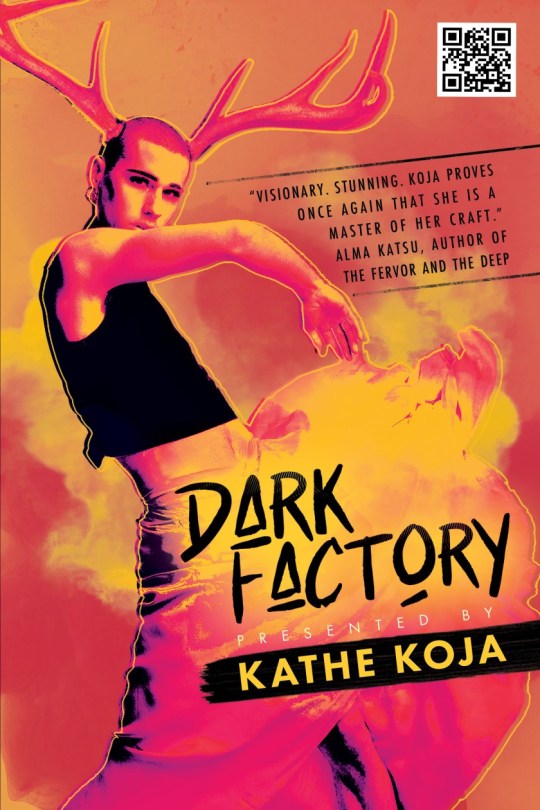
II. Dark Factory by Kathe Koja
Koja – an incredible, versatile writer who has pioneered multiple genres of fiction – presents an "immersive novel," about a high-stakes Bohemian party scene of mixed-reality artists, wealthy dilettantes, weird theorists and the very serious business of fun.
https://pluralistic.net/2022/03/20/a-walk-in-the-park/#all-night-party-people

III. Aspects by John M Ford
The long-awaited, unfinished first volume of a steampunk fantasy series, with an introduction by Neil Gaiman; "what Game of Thrones might have been, if the author had been fascinated by trains…communication and politics, magic, redemption, and the forms that love can take." A book of quiet – but stunning – erudition. Every aspect of Ford's world – its politics, its history, its geography, its magic, its technology, its economics, its mythos – rings true. What's more, every part of it fits together with the rest of it in a way that is so believable that it feels realer than our own world at times.
https://pluralistic.net/2022/04/09/john-m-ford/#aspects

IV. Up Against It by Laura J Mixon
The cracking first volume of WAVE, a space-opera series that manages to be both original — full of smart new ways of looking at science fiction ideas — and old fashioned — full of the kind of whiz-bang action-adventure that made so many of us fall in love with the field in the first place, about high-stakes administration of a space colony, where being good at your job is the utmost praxis. Republished as part of the Tor Essentials line.
https://pluralistic.net/2022/04/25/mj-locke-rides-again/#two-fisted-astro-bureaucrats

V. The Animals In That Country by Laura Jean McKay
An extraordinary debut novel, about a plague of understanding that sweeps across Australia, leaving the infected cursed with the ability to communicate with animals. It's an inversion of the standard trope of people and animals communicating with one another and finding mutual understanding and peace as a result. McKay sets herself the (seemingly) impossible of dramatizing human-animal communication without anthropomorphizing the animals, and then pulls it off – brilliantly.
https://pluralistic.net/2022/04/27/im-a-backdoor-man/#doolittle

VI. Just Like Home by Sarah Gailey
A gothic horror/haunted house novel that made the hairs on the back of my neck stand up. It's a spooky tale of body-horror and homecoming that's full of twists and turns and unexpected villains and heroes. Vera's father Francis Crowder was a serial killer, but he loved her. He built the house she grew up in with his own hands, including the soundproofed basement. He did bad things, and he went to prison for them, and Vera never saw him again.
https://pluralistic.net/2022/07/25/can-you-hear-me-now/#crowder-house

VII. A Half-Built Garden by Ruthanna Emrys
A spectacular first-contact novel about complicated utopias and networked conflict – it's a wild ride, where the protagonist is a perfect match for the world, where a century of incredibly hard, smart work has carried us through the climate emergency, to the point where it's possible to believe that, over time, we will stabilize our relationship with the only known planet in the known universe capable of sustaining our species.
https://pluralistic.net/2022/07/26/aislands/#dead-ringers

VIII. When Franny Stands Up by Eden Robins
Here's the McGuffin of this debut novel: The advent of World War II and the rise of woman comedians (filling in the vacuum left by the departure of all the men) reveals the existence of Showstoppers: involuntary psychic reactions that woman comedians can induce in female audience members when they're really cooking. A book that feels simultaneously utterly contemporary and like an old, beloved classic.
https://pluralistic.net/2022/11/01/eden-robins/#alt-history-comedy
Next up: Kids books!
https://mostlysignssomeportents.tumblr.com/post/702452328987508736/all-the-books-i-reviewed-in-2022-part-ii-books
Image: Matthew Petroff https://commons.wikimedia.org/wiki/File:George-peabody-library.jpg
CC BY-SA 3.0 https://creativecommons.org/licenses/by-sa/3.0/deed.en
[Image ID: Interior of the George Peabody Library in Baltimore.]
20 notes
·
View notes
Note
was thinking about how Blackthorne is a game I used to hear about a lot in Brazilian gaming circles but like, once or twice ever in English-speaking circles (to be fair, that applies to a lot other SNES and MEGA DRIVE titles I can think of right now)
what are some games that you know of very popular in your cultural circles that you don't think are widely recognized? bonus if you explain why they're cool or why the region/language/whatever specificity (is specificity a word?)
For Australia, my answer is very lame.
I got really into let's plays as a kid, loved shit like EarthBound or Chrono Trigger. I very vividly remember a specific moment of talking about EarthBound/Mother to a friend and they only vaguely knew what I meant once I said "y'know, that guy from Smash Bros. Brawl"
It was the precise moment I realized, to my mounting horror, that many JRPGs of the SNES era simply weren't ever released in PAL regions. Oh no! My blorbos are obscure!
As for Norway, my answer is very weird.
Games aren't generally translated into Norwegian unless they're for kids (this is also true of shows/movies/etc). So in terms of video games I was aware of in Norway were PC games for really young children - usually edutainment stuff.
So what do you mean you've never played classic PC game, Ludde and All His Friends, which you can beat in like half an hour and I just played repeatedly, endlessly fascinated.

2 notes
·
View notes
Quote
The Luddites weren’t merely science fictional, either. They took their name from King Ludd, or Captain (or General!) Ludd, a mythological titan who supposedly led their shadow army. The Luddites spun tall tales about this leader and signed his name to letters to the newspapers and to factory owners. King Ludd was a creature out of fantasy – an imaginary giant who was often depicted as towering over the factories that were the object of the Luddites’ rage.
Cory Doctorow
2 notes
·
View notes
